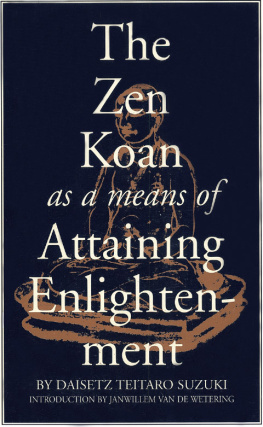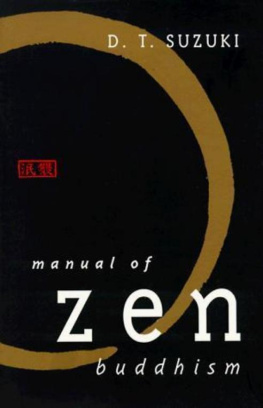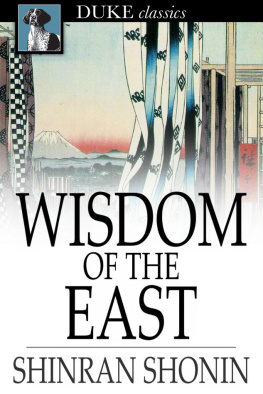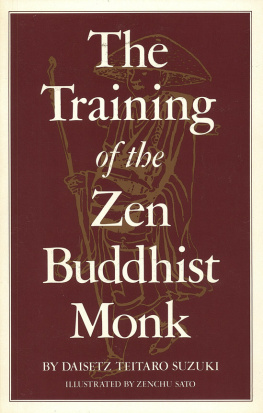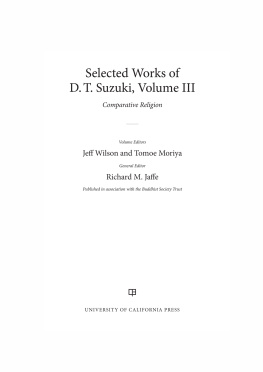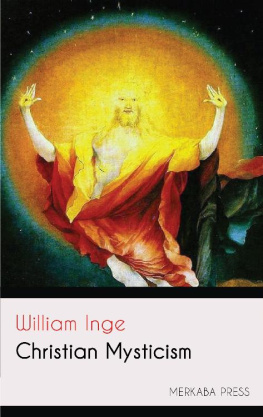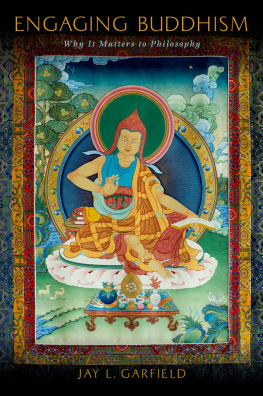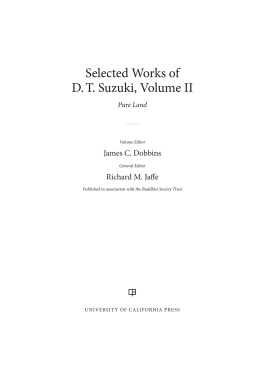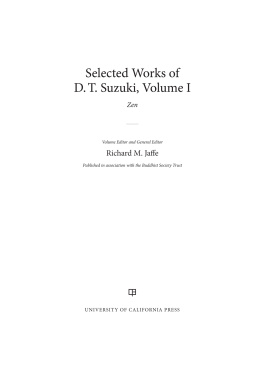Footnotes
Blakney, p. 212.
Evans, p. 209.
Blakney, p. 292.
Ibid., p. 62.
Ibid., p. 278.
Evans, p. 206.
Blakney, pp. 224-5.
Evans, p. 247.
Blakney, p. 180.
Evans, p. 38.
Quoted by Eckhart, Blakney, p. 305.
Cf. Blakney, p. 214: "The soul that lives in the present Now-moment is the soul in which the Father begets his only begotten Son and in that birth the soul is born again into God. It is one birth, as fast as she is reborn into God the Father is begetting his only Son in her." (The last sentence is from Evans, p. 209.)
Ibid., "The Defense," p. 303.
Evans, pp. 142-3.
The Transformation of Nature in Art, p. 201.
Blakney, "About Disinterest," p. 82. The translator prefers "disinterest" to "detachment" for abegescheidenheit. I really do not know which is better. The German word seems to correspond to the Sanskrit anabhnivesa or asanga (mushjaku in Japanese and wu chih chu in Chinese), meaning "not attached," "not clinging to."
Evans, with a little change, pp. 341-2.
Blakney, pp. 298-9.
Evans, p. 143.
Blakney, p. 247.
Ibid., p. 89.
Ibid., p. 216.
Ibid., p. 89.
"Von erkennen kennelos und von minne minnelos und von liehte vinster." Pfeiffer, p. 491.
Blakney, p. 88.
Translated by Arthur Waley. (From his The Way and Its Power, published 1934 by George Allen and Unwin Ltd. The succeeding quotations from Tao T Ching are all my rendering.) Chapter IV. God here is distinguished from Godhead as by Eckhart. The last two lines are my own version.
Evans, p. 148.
It is entitled Hekigan-shu or Hekigan-roku meaning "Blue Rock Collection" or "Blue Rock Records."
Evans, p. 13.
"Hie muoz komen in ein vergezzen und in ein nihtwizzen." Pfeiffer, p. 14. Evans, p. 13.
Yengo is given here in a modernized fashion, for the original Chinese would require a detailed interpretation.
Bodhidharma.
S in Japanese, hsiang in Chinese, lakaa in Sanskrit.
The Transmission of the Lamp (Dentoroku), fas. XI.
The Dhammapada, translated by S. Radhakrishnan (Oxford University Press, 1951), verses 277-9, pp. 146-7. I do not, however, always follow him in my quotations in this book.
Studies in Zen (London: Rider and Company, 1955), pp. 85-128.
Evans, pp. 147 ff.
The Dhammapada, verse 348, p. 167.
Studies in the Lankvatra Stra, pp. 223 ff.
"Sabbe dhamma anatt ti yad paya passati."
The Dhammapada, pp. 153-4. (Published by Oxford University Press, 1936.)
Dhamma in Pali. It has a multiple meaning and is difficult to render it uniformly. Here it stands for Truth, Reality, Norm.
"O taste and see that the Lord is good; blessed is the man that trusteth in him." (Psalms, 34:8.)
Evans, p. 246.
Pfeiffer, p. 319. "Du mit ime verstandest ewicliche sine ungewordene istikeit under sine ungenanten nihtheit."
Evans, p. 246.
Lankvatra Stra, translated by D. T. Suzuki (London: George Routledge and Sons, Ltd., 1932), p. 77.
Evans, p. 228.
Ibid., p. 204.
Ibid., p, 204,
Ibid., p. 37.
"Ein luter wesen" in German. Luter means "intellectually or analytically clear and distinct," opposed to what may be called "metaphysically indefinite."
Evans, pp. 204-5.
Quoted by Eckhart, Evans, p. 205.
Pfeiffer, p. 296.
A more or less modernized interpretation given to Yengo's terse and loosely knit Chinese.
Literally, "question and answer."
St. Augustine, Confessions, Book XI, 14.
Evans, p. 134.
Blakney, p. 231.
Evans, p. 221.
Blakney, p. 72.
Ibid., pp. 72, 73.
"Ein unbedahtiu warheit" (Pfeiffer, p. 284), that is, a truth not premeditated but spontaneously coming to mind.
Blakney, p. 232.
Studies in Zen, p. 126.
Pfeiffer, p. 265.
From the Sayings of Dait Kokushi.
The original literally has, "The thirty-three heavens and the twenty-eight constellations."
Literally, "When the firework has not yet been cracked."
"The white bullock" is the symbol for the Highest Reality.
This is a more or less ironical remark on the part of the master.
The Vinaya, I, p. 8. The Majjhima Nikya (translated by Lord Chalmers, published by Oxford University Press), 26, p. 12.
It will be interesting to note that we have another gth in The Dhammapada, v. 353, which also echoes the same sentiment as the one here quoted from another source. It is possible that they are from one and the same original source. The Dhammapada one runs thus:
I have conquered all, I know all, in all conditions of life I am free from taint. I have left all, and through the destruction of thirst I am free. Having by myself attained specific knowledge, to whom can I point as my teacher?
Evans, p. 14. "This birth" in this sermon means "the newborn Being" or "the child of man turned into the child of God." It also means "hearing of the Word" which is revealed to "one who knows aright in unknowing."
Blakney, p. 179.
Ibid.
These questions and answers may sound somewhat enigmatic to most of our readers. A full explanation will be given elsewhere on a more opportune occasion.
Blakney, p. 81.
Ibid., p. 206.
Ibid., p. 80.
Ibid., p. 79.
Ibid., p. 78.
Ibid., p. 79.
Ibid., pp. 79-80.
Ibid., p. 166.
Ibid., p. 81.
Ibid.
Ibid., p. 168.
Ibid., p. 166.
Ibid., pp. 165 et seq.
Ibid., pp. 203 et seq.
Eckhart quotes St. Paul as saying: "I could wish to be cut off eternally from God for my friends' sake and for God's sake." This I understand corresponds to the King James version, Romans, 9:3, "But I could wish that myself were accursed from Christ for my brethren, my kinsmen according to the flesh." I do not know how this discrepancy takes place between the two quotations as I have no Greek texts with me. Eckhart bases his argument on his Latin text, I believe.
Ibid., p. 231.
The original German is "in miner ersten ursache." The translator has substituted this term, I do not know whether this is a happy translation or not.
Blakney, p. 228.
Ibid., p. 229.
The Dictionary of Philosophy, edited by Dagobert D. Runes (New York: Philosophical Library), p. 97.
Henry Vaughan, "The World."
History of Western Philosophy, p. 144.
Dialogues of Plato, translated by B. Jowett (London: Oxford University Press), Vol. III, p. 456. Published in the United States by Random House.
Ibid., p. 398.
The Mdhyamika-stra, "Treatise on the Middle Way."
In the "as-it-is-ness" of things.
"Flower in the Crannied Wall."
"Compassion." One may say it is the Buddhist equivalent of love.
Yoku mireba
Nazuna hana saku
Kakine kana!
[When] carefully seen,
Nazuna in bloom,
The hedge!
Centuries of Meditations, Thomas Traherne, 1636-1674 (London: P. J. & A. E. Dobell), p. 19.
Ibid.
Blakney, p. 180.
Eckhart's idea of "justice" may be gleaned from the following passages from his "Sermon" 18 (Blakney, pp. 178-82):
"He is just who gives to each what belongs to him."
"They are just who take everything from God evenly, just as it comes, great and small, desirable and undesirable, one thing like another, all the same, and neither more nor less."


